Psychological Impact on Media Report 2022
VerifiedAdded on 2022/10/17
|13
|3538
|14
AI Summary
Contribute Materials
Your contribution can guide someone’s learning journey. Share your
documents today.
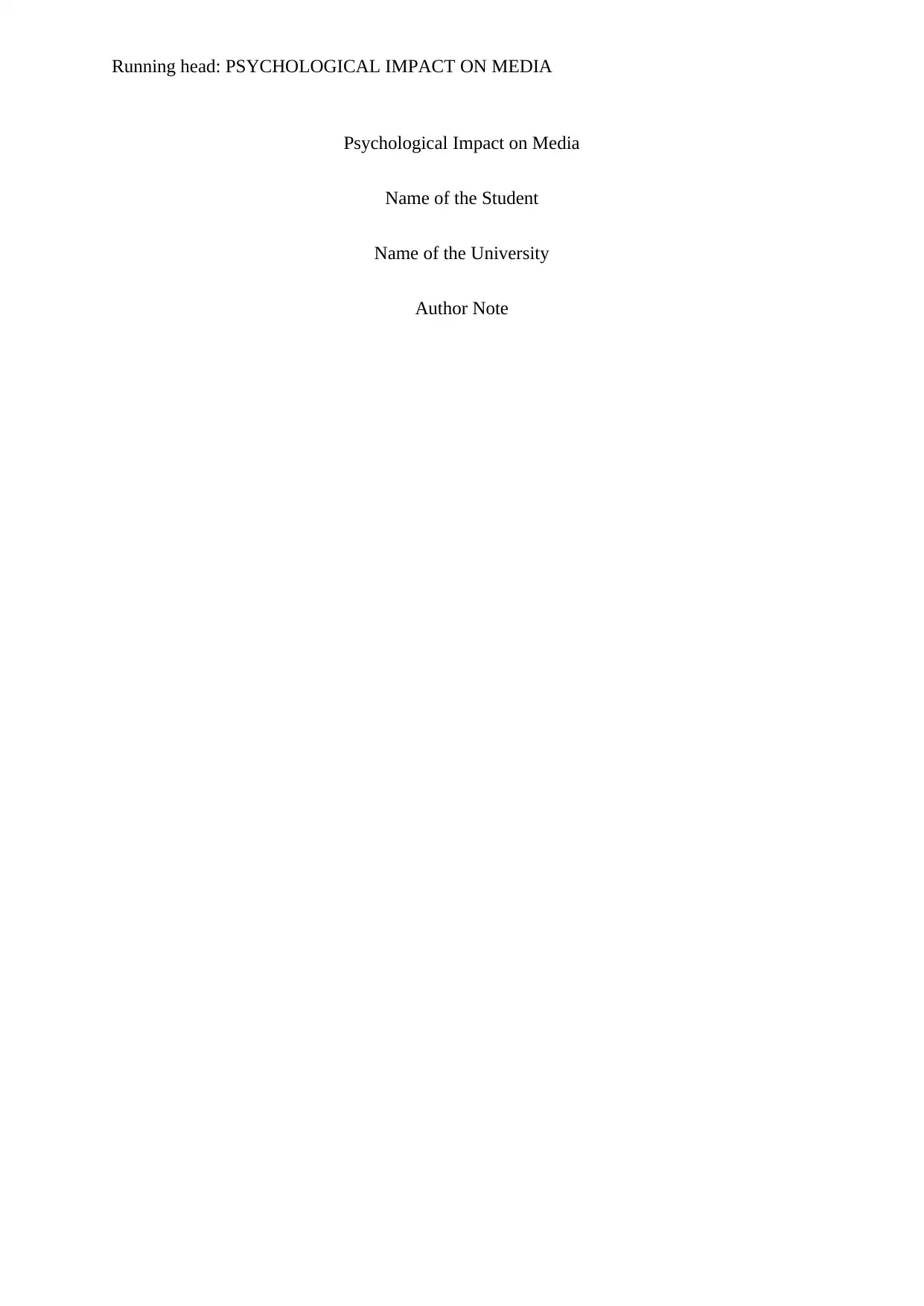
Running head: PSYCHOLOGICAL IMPACT ON MEDIA
Psychological Impact on Media
Name of the Student
Name of the University
Author Note
Psychological Impact on Media
Name of the Student
Name of the University
Author Note
Secure Best Marks with AI Grader
Need help grading? Try our AI Grader for instant feedback on your assignments.
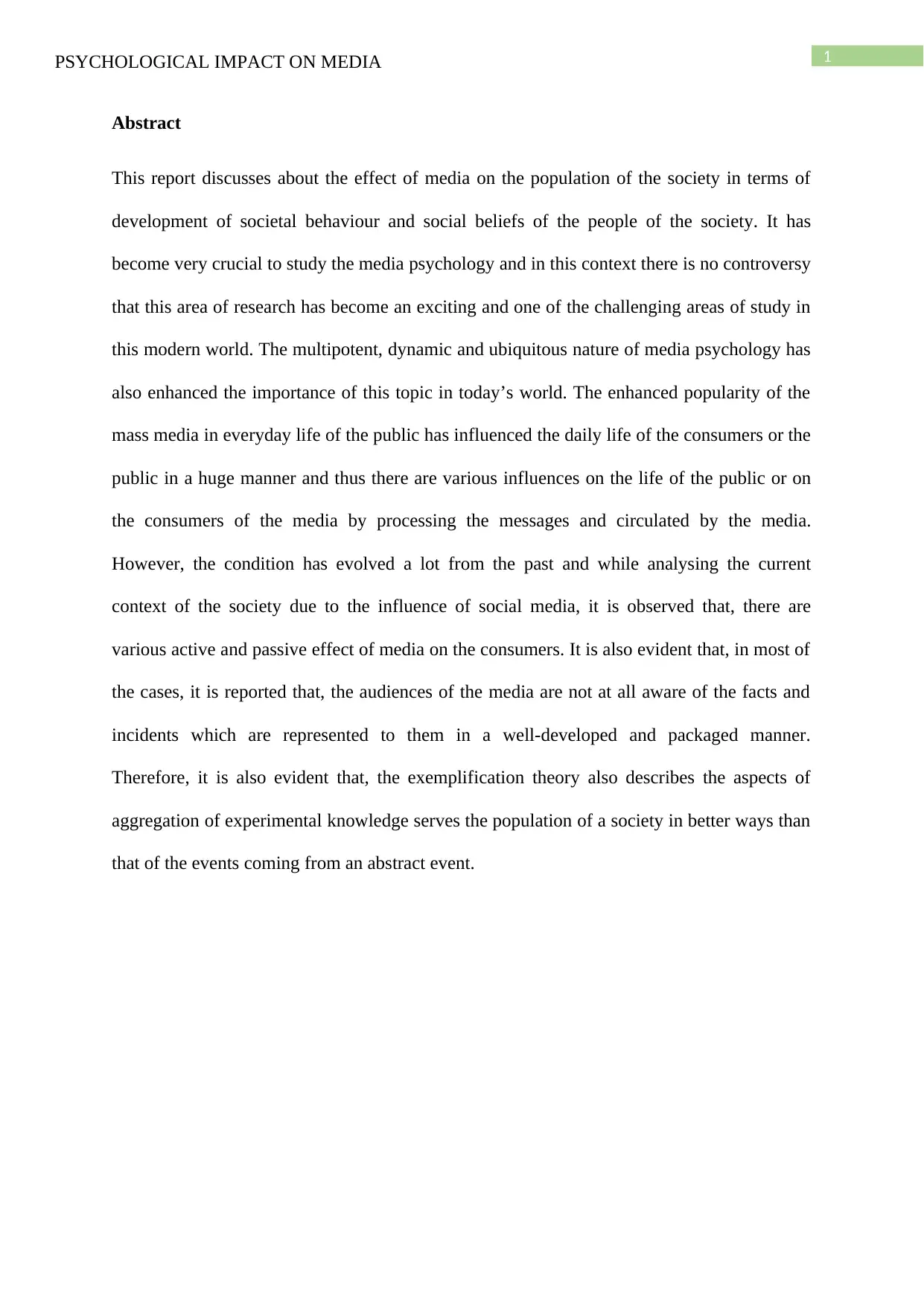
1PSYCHOLOGICAL IMPACT ON MEDIA
Abstract
This report discusses about the effect of media on the population of the society in terms of
development of societal behaviour and social beliefs of the people of the society. It has
become very crucial to study the media psychology and in this context there is no controversy
that this area of research has become an exciting and one of the challenging areas of study in
this modern world. The multipotent, dynamic and ubiquitous nature of media psychology has
also enhanced the importance of this topic in today’s world. The enhanced popularity of the
mass media in everyday life of the public has influenced the daily life of the consumers or the
public in a huge manner and thus there are various influences on the life of the public or on
the consumers of the media by processing the messages and circulated by the media.
However, the condition has evolved a lot from the past and while analysing the current
context of the society due to the influence of social media, it is observed that, there are
various active and passive effect of media on the consumers. It is also evident that, in most of
the cases, it is reported that, the audiences of the media are not at all aware of the facts and
incidents which are represented to them in a well-developed and packaged manner.
Therefore, it is also evident that, the exemplification theory also describes the aspects of
aggregation of experimental knowledge serves the population of a society in better ways than
that of the events coming from an abstract event.
Abstract
This report discusses about the effect of media on the population of the society in terms of
development of societal behaviour and social beliefs of the people of the society. It has
become very crucial to study the media psychology and in this context there is no controversy
that this area of research has become an exciting and one of the challenging areas of study in
this modern world. The multipotent, dynamic and ubiquitous nature of media psychology has
also enhanced the importance of this topic in today’s world. The enhanced popularity of the
mass media in everyday life of the public has influenced the daily life of the consumers or the
public in a huge manner and thus there are various influences on the life of the public or on
the consumers of the media by processing the messages and circulated by the media.
However, the condition has evolved a lot from the past and while analysing the current
context of the society due to the influence of social media, it is observed that, there are
various active and passive effect of media on the consumers. It is also evident that, in most of
the cases, it is reported that, the audiences of the media are not at all aware of the facts and
incidents which are represented to them in a well-developed and packaged manner.
Therefore, it is also evident that, the exemplification theory also describes the aspects of
aggregation of experimental knowledge serves the population of a society in better ways than
that of the events coming from an abstract event.
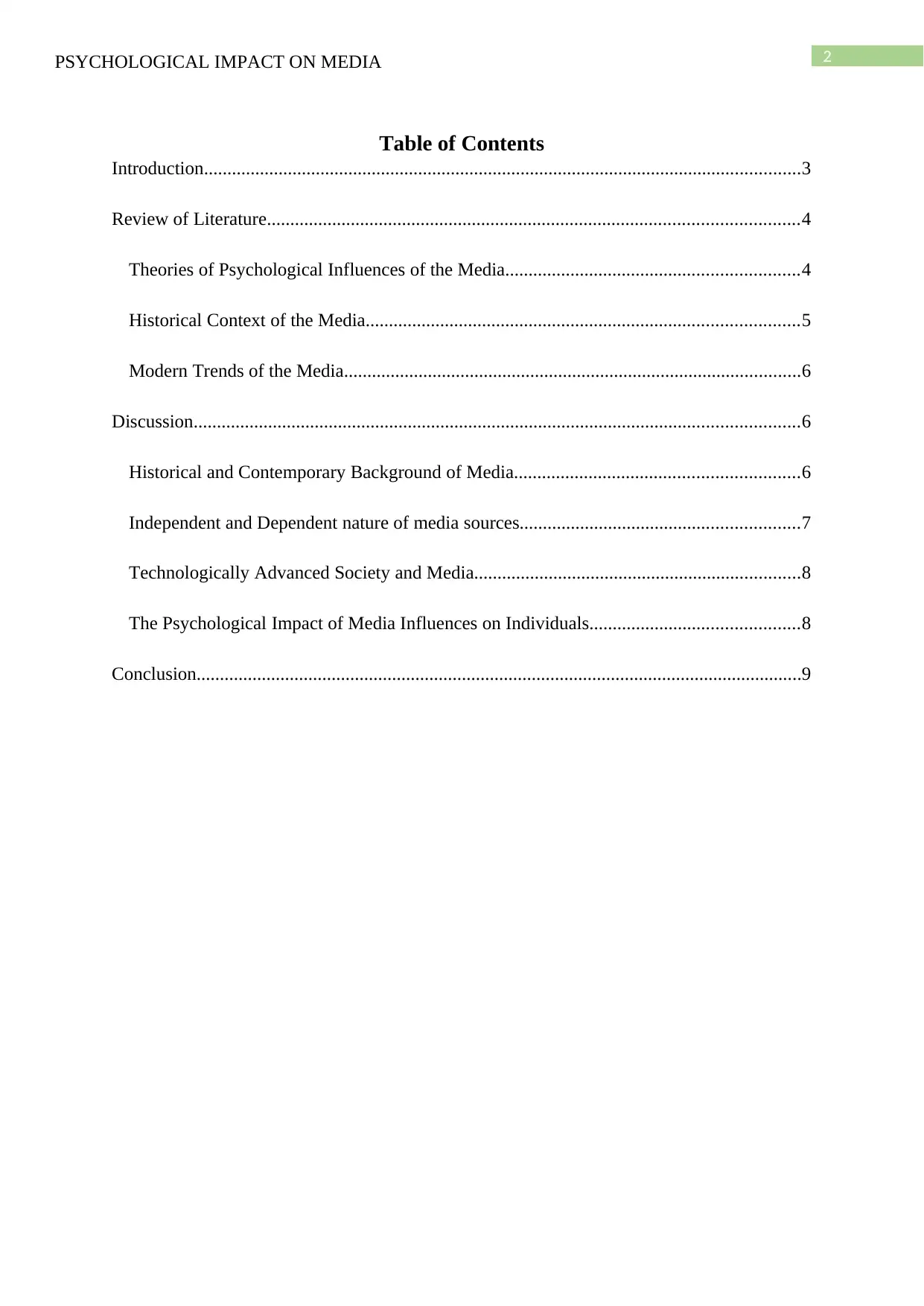
2PSYCHOLOGICAL IMPACT ON MEDIA
Table of Contents
Introduction................................................................................................................................3
Review of Literature..................................................................................................................4
Theories of Psychological Influences of the Media...............................................................4
Historical Context of the Media.............................................................................................5
Modern Trends of the Media..................................................................................................6
Discussion..................................................................................................................................6
Historical and Contemporary Background of Media.............................................................6
Independent and Dependent nature of media sources............................................................7
Technologically Advanced Society and Media......................................................................8
The Psychological Impact of Media Influences on Individuals.............................................8
Conclusion..................................................................................................................................9
Table of Contents
Introduction................................................................................................................................3
Review of Literature..................................................................................................................4
Theories of Psychological Influences of the Media...............................................................4
Historical Context of the Media.............................................................................................5
Modern Trends of the Media..................................................................................................6
Discussion..................................................................................................................................6
Historical and Contemporary Background of Media.............................................................6
Independent and Dependent nature of media sources............................................................7
Technologically Advanced Society and Media......................................................................8
The Psychological Impact of Media Influences on Individuals.............................................8
Conclusion..................................................................................................................................9
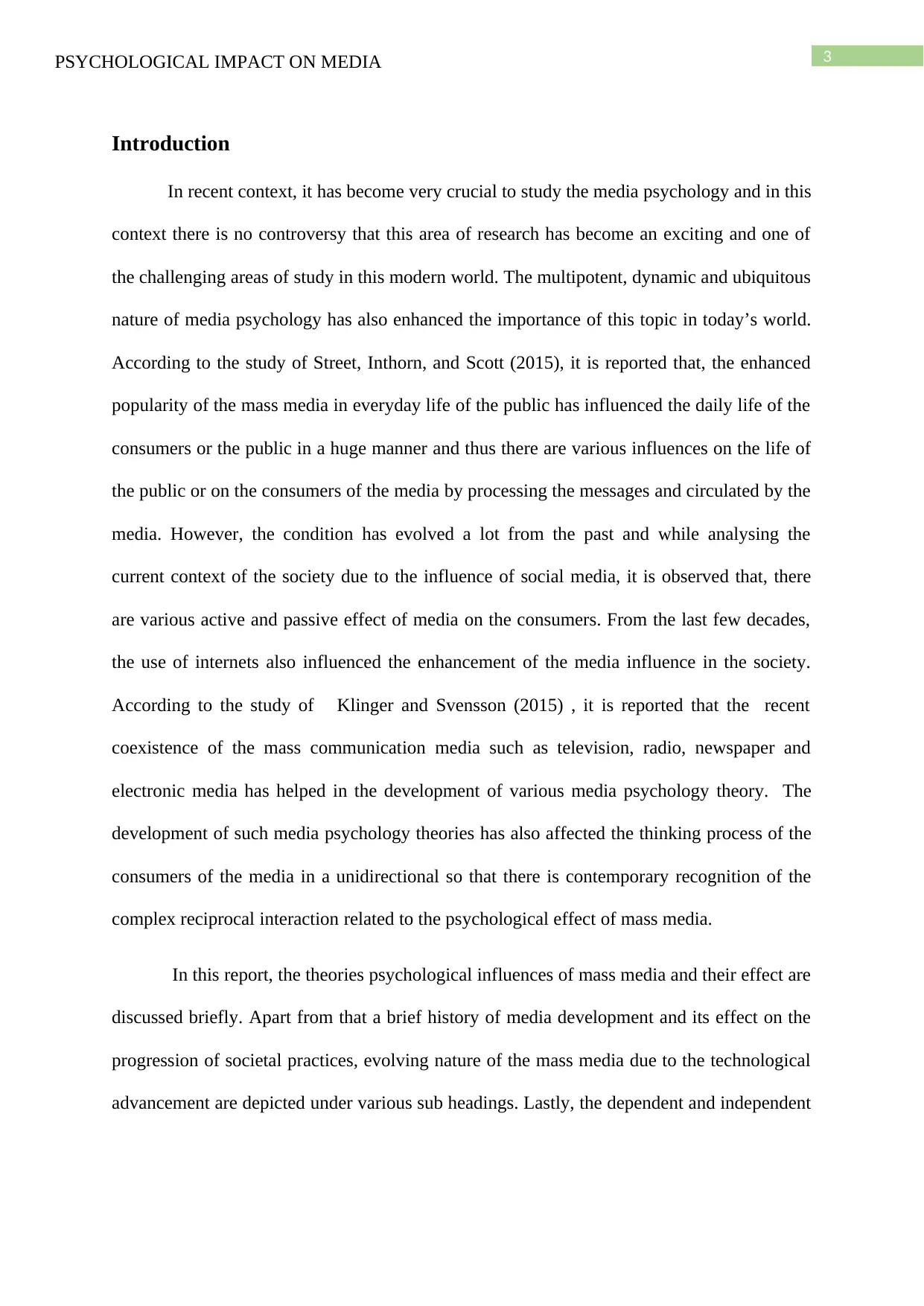
3PSYCHOLOGICAL IMPACT ON MEDIA
Introduction
In recent context, it has become very crucial to study the media psychology and in this
context there is no controversy that this area of research has become an exciting and one of
the challenging areas of study in this modern world. The multipotent, dynamic and ubiquitous
nature of media psychology has also enhanced the importance of this topic in today’s world.
According to the study of Street, Inthorn, and Scott (2015), it is reported that, the enhanced
popularity of the mass media in everyday life of the public has influenced the daily life of the
consumers or the public in a huge manner and thus there are various influences on the life of
the public or on the consumers of the media by processing the messages and circulated by the
media. However, the condition has evolved a lot from the past and while analysing the
current context of the society due to the influence of social media, it is observed that, there
are various active and passive effect of media on the consumers. From the last few decades,
the use of internets also influenced the enhancement of the media influence in the society.
According to the study of Klinger and Svensson (2015) , it is reported that the recent
coexistence of the mass communication media such as television, radio, newspaper and
electronic media has helped in the development of various media psychology theory. The
development of such media psychology theories has also affected the thinking process of the
consumers of the media in a unidirectional so that there is contemporary recognition of the
complex reciprocal interaction related to the psychological effect of mass media.
In this report, the theories psychological influences of mass media and their effect are
discussed briefly. Apart from that a brief history of media development and its effect on the
progression of societal practices, evolving nature of the mass media due to the technological
advancement are depicted under various sub headings. Lastly, the dependent and independent
Introduction
In recent context, it has become very crucial to study the media psychology and in this
context there is no controversy that this area of research has become an exciting and one of
the challenging areas of study in this modern world. The multipotent, dynamic and ubiquitous
nature of media psychology has also enhanced the importance of this topic in today’s world.
According to the study of Street, Inthorn, and Scott (2015), it is reported that, the enhanced
popularity of the mass media in everyday life of the public has influenced the daily life of the
consumers or the public in a huge manner and thus there are various influences on the life of
the public or on the consumers of the media by processing the messages and circulated by the
media. However, the condition has evolved a lot from the past and while analysing the
current context of the society due to the influence of social media, it is observed that, there
are various active and passive effect of media on the consumers. From the last few decades,
the use of internets also influenced the enhancement of the media influence in the society.
According to the study of Klinger and Svensson (2015) , it is reported that the recent
coexistence of the mass communication media such as television, radio, newspaper and
electronic media has helped in the development of various media psychology theory. The
development of such media psychology theories has also affected the thinking process of the
consumers of the media in a unidirectional so that there is contemporary recognition of the
complex reciprocal interaction related to the psychological effect of mass media.
In this report, the theories psychological influences of mass media and their effect are
discussed briefly. Apart from that a brief history of media development and its effect on the
progression of societal practices, evolving nature of the mass media due to the technological
advancement are depicted under various sub headings. Lastly, the dependent and independent
Paraphrase This Document
Need a fresh take? Get an instant paraphrase of this document with our AI Paraphraser
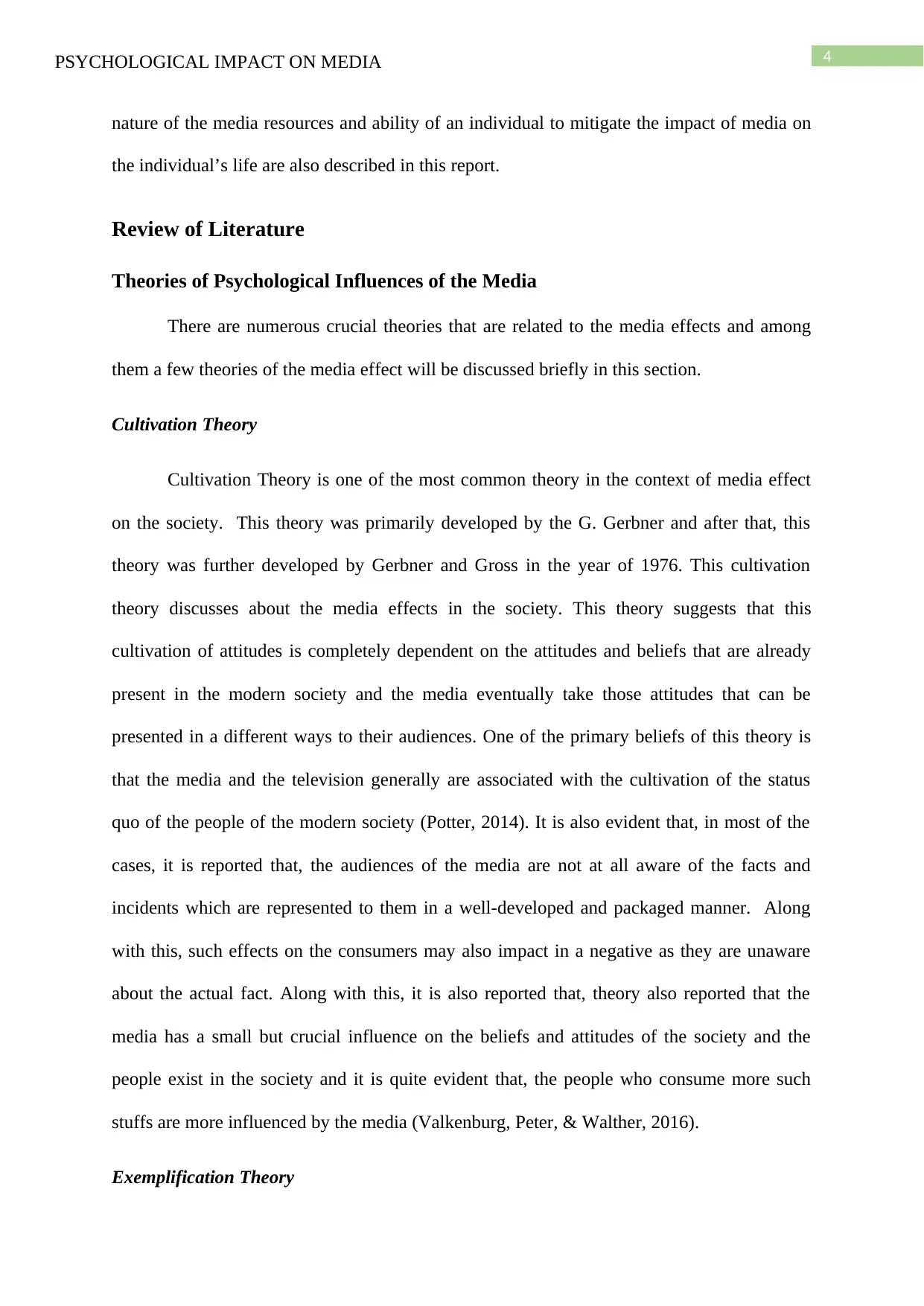
4PSYCHOLOGICAL IMPACT ON MEDIA
nature of the media resources and ability of an individual to mitigate the impact of media on
the individual’s life are also described in this report.
Review of Literature
Theories of Psychological Influences of the Media
There are numerous crucial theories that are related to the media effects and among
them a few theories of the media effect will be discussed briefly in this section.
Cultivation Theory
Cultivation Theory is one of the most common theory in the context of media effect
on the society. This theory was primarily developed by the G. Gerbner and after that, this
theory was further developed by Gerbner and Gross in the year of 1976. This cultivation
theory discusses about the media effects in the society. This theory suggests that this
cultivation of attitudes is completely dependent on the attitudes and beliefs that are already
present in the modern society and the media eventually take those attitudes that can be
presented in a different ways to their audiences. One of the primary beliefs of this theory is
that the media and the television generally are associated with the cultivation of the status
quo of the people of the modern society (Potter, 2014). It is also evident that, in most of the
cases, it is reported that, the audiences of the media are not at all aware of the facts and
incidents which are represented to them in a well-developed and packaged manner. Along
with this, such effects on the consumers may also impact in a negative as they are unaware
about the actual fact. Along with this, it is also reported that, theory also reported that the
media has a small but crucial influence on the beliefs and attitudes of the society and the
people exist in the society and it is quite evident that, the people who consume more such
stuffs are more influenced by the media (Valkenburg, Peter, & Walther, 2016).
Exemplification Theory
nature of the media resources and ability of an individual to mitigate the impact of media on
the individual’s life are also described in this report.
Review of Literature
Theories of Psychological Influences of the Media
There are numerous crucial theories that are related to the media effects and among
them a few theories of the media effect will be discussed briefly in this section.
Cultivation Theory
Cultivation Theory is one of the most common theory in the context of media effect
on the society. This theory was primarily developed by the G. Gerbner and after that, this
theory was further developed by Gerbner and Gross in the year of 1976. This cultivation
theory discusses about the media effects in the society. This theory suggests that this
cultivation of attitudes is completely dependent on the attitudes and beliefs that are already
present in the modern society and the media eventually take those attitudes that can be
presented in a different ways to their audiences. One of the primary beliefs of this theory is
that the media and the television generally are associated with the cultivation of the status
quo of the people of the modern society (Potter, 2014). It is also evident that, in most of the
cases, it is reported that, the audiences of the media are not at all aware of the facts and
incidents which are represented to them in a well-developed and packaged manner. Along
with this, such effects on the consumers may also impact in a negative as they are unaware
about the actual fact. Along with this, it is also reported that, theory also reported that the
media has a small but crucial influence on the beliefs and attitudes of the society and the
people exist in the society and it is quite evident that, the people who consume more such
stuffs are more influenced by the media (Valkenburg, Peter, & Walther, 2016).
Exemplification Theory
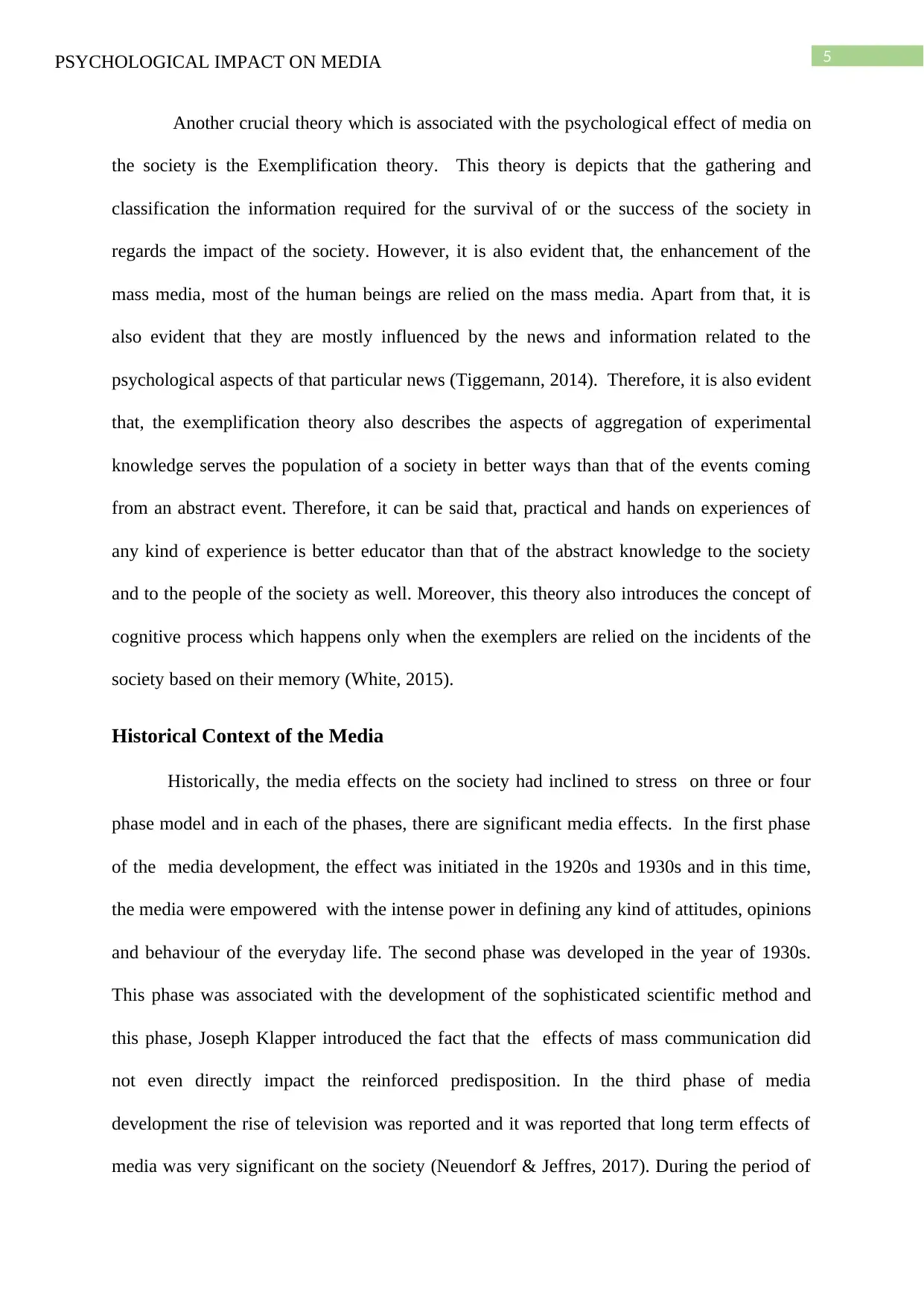
5PSYCHOLOGICAL IMPACT ON MEDIA
Another crucial theory which is associated with the psychological effect of media on
the society is the Exemplification theory. This theory is depicts that the gathering and
classification the information required for the survival of or the success of the society in
regards the impact of the society. However, it is also evident that, the enhancement of the
mass media, most of the human beings are relied on the mass media. Apart from that, it is
also evident that they are mostly influenced by the news and information related to the
psychological aspects of that particular news (Tiggemann, 2014). Therefore, it is also evident
that, the exemplification theory also describes the aspects of aggregation of experimental
knowledge serves the population of a society in better ways than that of the events coming
from an abstract event. Therefore, it can be said that, practical and hands on experiences of
any kind of experience is better educator than that of the abstract knowledge to the society
and to the people of the society as well. Moreover, this theory also introduces the concept of
cognitive process which happens only when the exemplers are relied on the incidents of the
society based on their memory (White, 2015).
Historical Context of the Media
Historically, the media effects on the society had inclined to stress on three or four
phase model and in each of the phases, there are significant media effects. In the first phase
of the media development, the effect was initiated in the 1920s and 1930s and in this time,
the media were empowered with the intense power in defining any kind of attitudes, opinions
and behaviour of the everyday life. The second phase was developed in the year of 1930s.
This phase was associated with the development of the sophisticated scientific method and
this phase, Joseph Klapper introduced the fact that the effects of mass communication did
not even directly impact the reinforced predisposition. In the third phase of media
development the rise of television was reported and it was reported that long term effects of
media was very significant on the society (Neuendorf & Jeffres, 2017). During the period of
Another crucial theory which is associated with the psychological effect of media on
the society is the Exemplification theory. This theory is depicts that the gathering and
classification the information required for the survival of or the success of the society in
regards the impact of the society. However, it is also evident that, the enhancement of the
mass media, most of the human beings are relied on the mass media. Apart from that, it is
also evident that they are mostly influenced by the news and information related to the
psychological aspects of that particular news (Tiggemann, 2014). Therefore, it is also evident
that, the exemplification theory also describes the aspects of aggregation of experimental
knowledge serves the population of a society in better ways than that of the events coming
from an abstract event. Therefore, it can be said that, practical and hands on experiences of
any kind of experience is better educator than that of the abstract knowledge to the society
and to the people of the society as well. Moreover, this theory also introduces the concept of
cognitive process which happens only when the exemplers are relied on the incidents of the
society based on their memory (White, 2015).
Historical Context of the Media
Historically, the media effects on the society had inclined to stress on three or four
phase model and in each of the phases, there are significant media effects. In the first phase
of the media development, the effect was initiated in the 1920s and 1930s and in this time,
the media were empowered with the intense power in defining any kind of attitudes, opinions
and behaviour of the everyday life. The second phase was developed in the year of 1930s.
This phase was associated with the development of the sophisticated scientific method and
this phase, Joseph Klapper introduced the fact that the effects of mass communication did
not even directly impact the reinforced predisposition. In the third phase of media
development the rise of television was reported and it was reported that long term effects of
media was very significant on the society (Neuendorf & Jeffres, 2017). During the period of
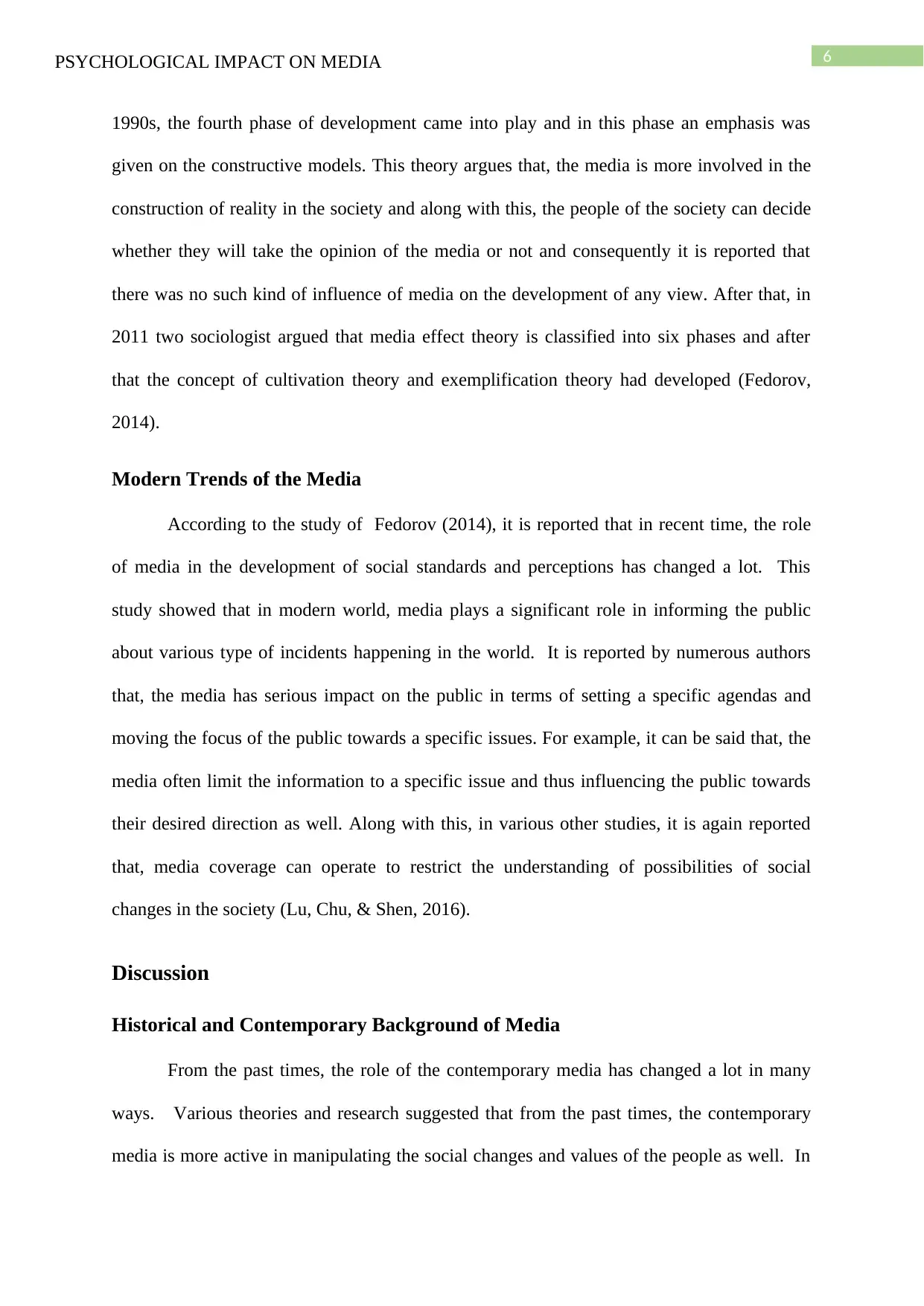
6PSYCHOLOGICAL IMPACT ON MEDIA
1990s, the fourth phase of development came into play and in this phase an emphasis was
given on the constructive models. This theory argues that, the media is more involved in the
construction of reality in the society and along with this, the people of the society can decide
whether they will take the opinion of the media or not and consequently it is reported that
there was no such kind of influence of media on the development of any view. After that, in
2011 two sociologist argued that media effect theory is classified into six phases and after
that the concept of cultivation theory and exemplification theory had developed (Fedorov,
2014).
Modern Trends of the Media
According to the study of Fedorov (2014), it is reported that in recent time, the role
of media in the development of social standards and perceptions has changed a lot. This
study showed that in modern world, media plays a significant role in informing the public
about various type of incidents happening in the world. It is reported by numerous authors
that, the media has serious impact on the public in terms of setting a specific agendas and
moving the focus of the public towards a specific issues. For example, it can be said that, the
media often limit the information to a specific issue and thus influencing the public towards
their desired direction as well. Along with this, in various other studies, it is again reported
that, media coverage can operate to restrict the understanding of possibilities of social
changes in the society (Lu, Chu, & Shen, 2016).
Discussion
Historical and Contemporary Background of Media
From the past times, the role of the contemporary media has changed a lot in many
ways. Various theories and research suggested that from the past times, the contemporary
media is more active in manipulating the social changes and values of the people as well. In
1990s, the fourth phase of development came into play and in this phase an emphasis was
given on the constructive models. This theory argues that, the media is more involved in the
construction of reality in the society and along with this, the people of the society can decide
whether they will take the opinion of the media or not and consequently it is reported that
there was no such kind of influence of media on the development of any view. After that, in
2011 two sociologist argued that media effect theory is classified into six phases and after
that the concept of cultivation theory and exemplification theory had developed (Fedorov,
2014).
Modern Trends of the Media
According to the study of Fedorov (2014), it is reported that in recent time, the role
of media in the development of social standards and perceptions has changed a lot. This
study showed that in modern world, media plays a significant role in informing the public
about various type of incidents happening in the world. It is reported by numerous authors
that, the media has serious impact on the public in terms of setting a specific agendas and
moving the focus of the public towards a specific issues. For example, it can be said that, the
media often limit the information to a specific issue and thus influencing the public towards
their desired direction as well. Along with this, in various other studies, it is again reported
that, media coverage can operate to restrict the understanding of possibilities of social
changes in the society (Lu, Chu, & Shen, 2016).
Discussion
Historical and Contemporary Background of Media
From the past times, the role of the contemporary media has changed a lot in many
ways. Various theories and research suggested that from the past times, the contemporary
media is more active in manipulating the social changes and values of the people as well. In
Secure Best Marks with AI Grader
Need help grading? Try our AI Grader for instant feedback on your assignments.
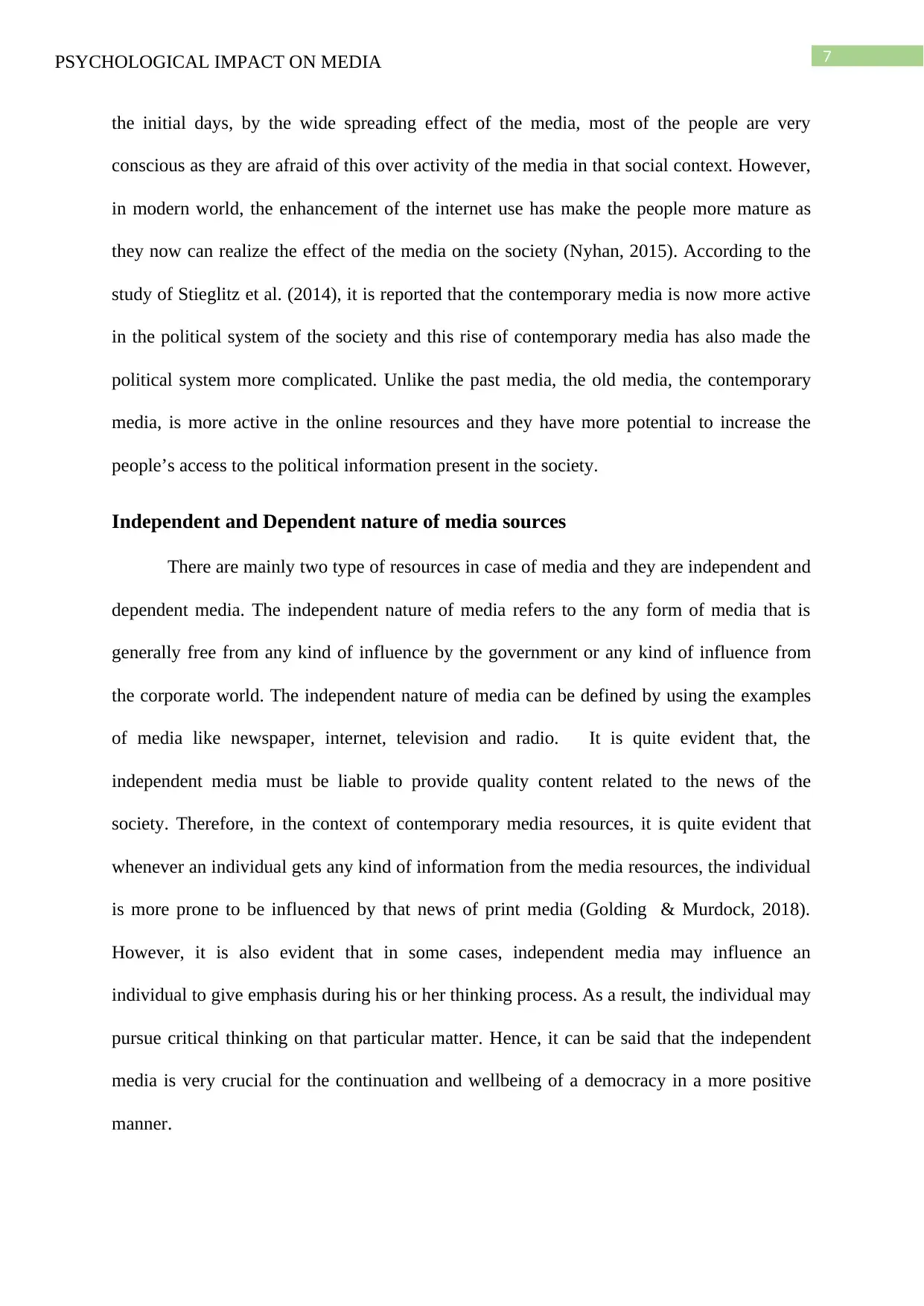
7PSYCHOLOGICAL IMPACT ON MEDIA
the initial days, by the wide spreading effect of the media, most of the people are very
conscious as they are afraid of this over activity of the media in that social context. However,
in modern world, the enhancement of the internet use has make the people more mature as
they now can realize the effect of the media on the society (Nyhan, 2015). According to the
study of Stieglitz et al. (2014), it is reported that the contemporary media is now more active
in the political system of the society and this rise of contemporary media has also made the
political system more complicated. Unlike the past media, the old media, the contemporary
media, is more active in the online resources and they have more potential to increase the
people’s access to the political information present in the society.
Independent and Dependent nature of media sources
There are mainly two type of resources in case of media and they are independent and
dependent media. The independent nature of media refers to the any form of media that is
generally free from any kind of influence by the government or any kind of influence from
the corporate world. The independent nature of media can be defined by using the examples
of media like newspaper, internet, television and radio. It is quite evident that, the
independent media must be liable to provide quality content related to the news of the
society. Therefore, in the context of contemporary media resources, it is quite evident that
whenever an individual gets any kind of information from the media resources, the individual
is more prone to be influenced by that news of print media (Golding & Murdock, 2018).
However, it is also evident that in some cases, independent media may influence an
individual to give emphasis during his or her thinking process. As a result, the individual may
pursue critical thinking on that particular matter. Hence, it can be said that the independent
media is very crucial for the continuation and wellbeing of a democracy in a more positive
manner.
the initial days, by the wide spreading effect of the media, most of the people are very
conscious as they are afraid of this over activity of the media in that social context. However,
in modern world, the enhancement of the internet use has make the people more mature as
they now can realize the effect of the media on the society (Nyhan, 2015). According to the
study of Stieglitz et al. (2014), it is reported that the contemporary media is now more active
in the political system of the society and this rise of contemporary media has also made the
political system more complicated. Unlike the past media, the old media, the contemporary
media, is more active in the online resources and they have more potential to increase the
people’s access to the political information present in the society.
Independent and Dependent nature of media sources
There are mainly two type of resources in case of media and they are independent and
dependent media. The independent nature of media refers to the any form of media that is
generally free from any kind of influence by the government or any kind of influence from
the corporate world. The independent nature of media can be defined by using the examples
of media like newspaper, internet, television and radio. It is quite evident that, the
independent media must be liable to provide quality content related to the news of the
society. Therefore, in the context of contemporary media resources, it is quite evident that
whenever an individual gets any kind of information from the media resources, the individual
is more prone to be influenced by that news of print media (Golding & Murdock, 2018).
However, it is also evident that in some cases, independent media may influence an
individual to give emphasis during his or her thinking process. As a result, the individual may
pursue critical thinking on that particular matter. Hence, it can be said that the independent
media is very crucial for the continuation and wellbeing of a democracy in a more positive
manner.
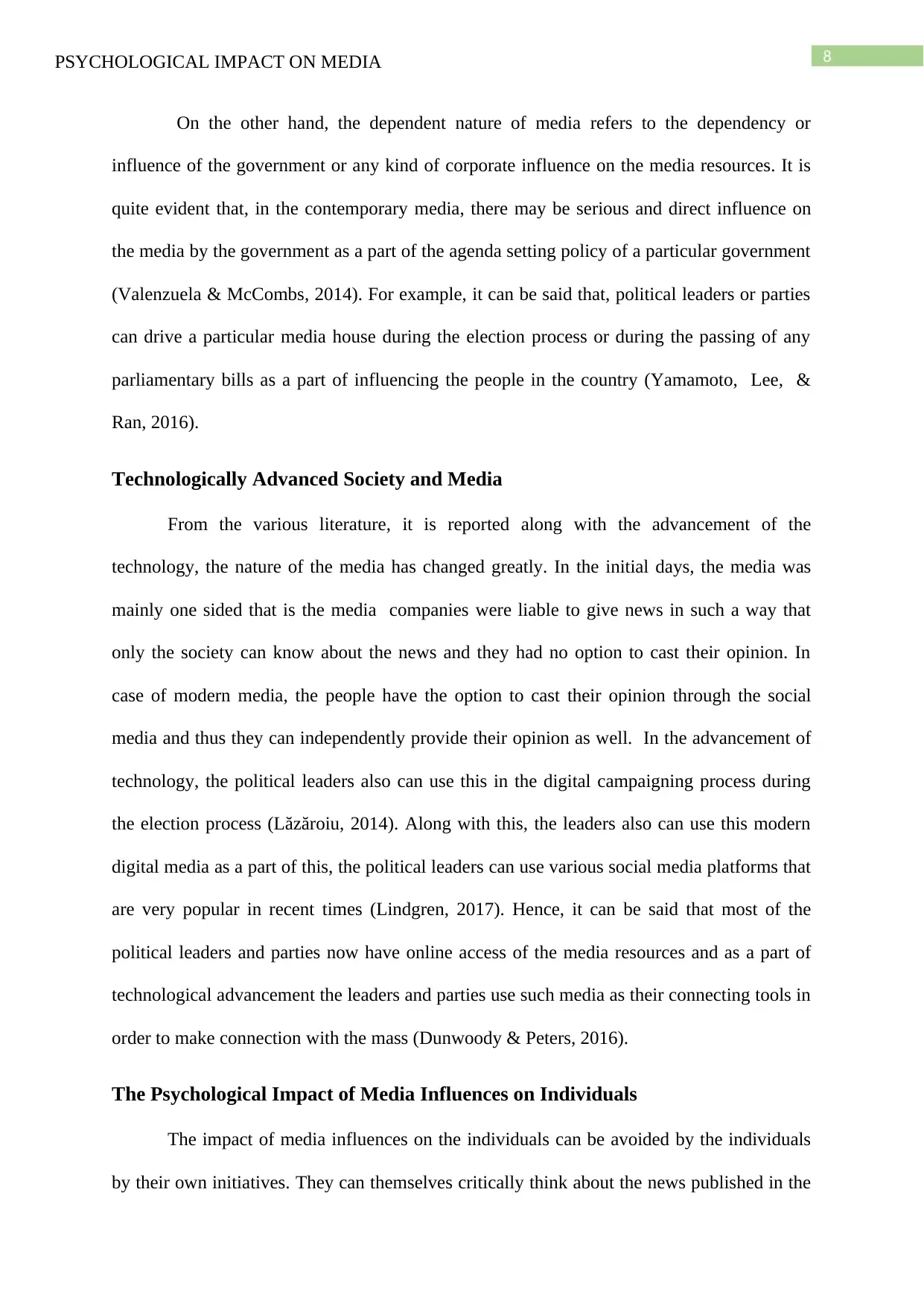
8PSYCHOLOGICAL IMPACT ON MEDIA
On the other hand, the dependent nature of media refers to the dependency or
influence of the government or any kind of corporate influence on the media resources. It is
quite evident that, in the contemporary media, there may be serious and direct influence on
the media by the government as a part of the agenda setting policy of a particular government
(Valenzuela & McCombs, 2014). For example, it can be said that, political leaders or parties
can drive a particular media house during the election process or during the passing of any
parliamentary bills as a part of influencing the people in the country (Yamamoto, Lee, &
Ran, 2016).
Technologically Advanced Society and Media
From the various literature, it is reported along with the advancement of the
technology, the nature of the media has changed greatly. In the initial days, the media was
mainly one sided that is the media companies were liable to give news in such a way that
only the society can know about the news and they had no option to cast their opinion. In
case of modern media, the people have the option to cast their opinion through the social
media and thus they can independently provide their opinion as well. In the advancement of
technology, the political leaders also can use this in the digital campaigning process during
the election process (Lăzăroiu, 2014). Along with this, the leaders also can use this modern
digital media as a part of this, the political leaders can use various social media platforms that
are very popular in recent times (Lindgren, 2017). Hence, it can be said that most of the
political leaders and parties now have online access of the media resources and as a part of
technological advancement the leaders and parties use such media as their connecting tools in
order to make connection with the mass (Dunwoody & Peters, 2016).
The Psychological Impact of Media Influences on Individuals
The impact of media influences on the individuals can be avoided by the individuals
by their own initiatives. They can themselves critically think about the news published in the
On the other hand, the dependent nature of media refers to the dependency or
influence of the government or any kind of corporate influence on the media resources. It is
quite evident that, in the contemporary media, there may be serious and direct influence on
the media by the government as a part of the agenda setting policy of a particular government
(Valenzuela & McCombs, 2014). For example, it can be said that, political leaders or parties
can drive a particular media house during the election process or during the passing of any
parliamentary bills as a part of influencing the people in the country (Yamamoto, Lee, &
Ran, 2016).
Technologically Advanced Society and Media
From the various literature, it is reported along with the advancement of the
technology, the nature of the media has changed greatly. In the initial days, the media was
mainly one sided that is the media companies were liable to give news in such a way that
only the society can know about the news and they had no option to cast their opinion. In
case of modern media, the people have the option to cast their opinion through the social
media and thus they can independently provide their opinion as well. In the advancement of
technology, the political leaders also can use this in the digital campaigning process during
the election process (Lăzăroiu, 2014). Along with this, the leaders also can use this modern
digital media as a part of this, the political leaders can use various social media platforms that
are very popular in recent times (Lindgren, 2017). Hence, it can be said that most of the
political leaders and parties now have online access of the media resources and as a part of
technological advancement the leaders and parties use such media as their connecting tools in
order to make connection with the mass (Dunwoody & Peters, 2016).
The Psychological Impact of Media Influences on Individuals
The impact of media influences on the individuals can be avoided by the individuals
by their own initiatives. They can themselves critically think about the news published in the
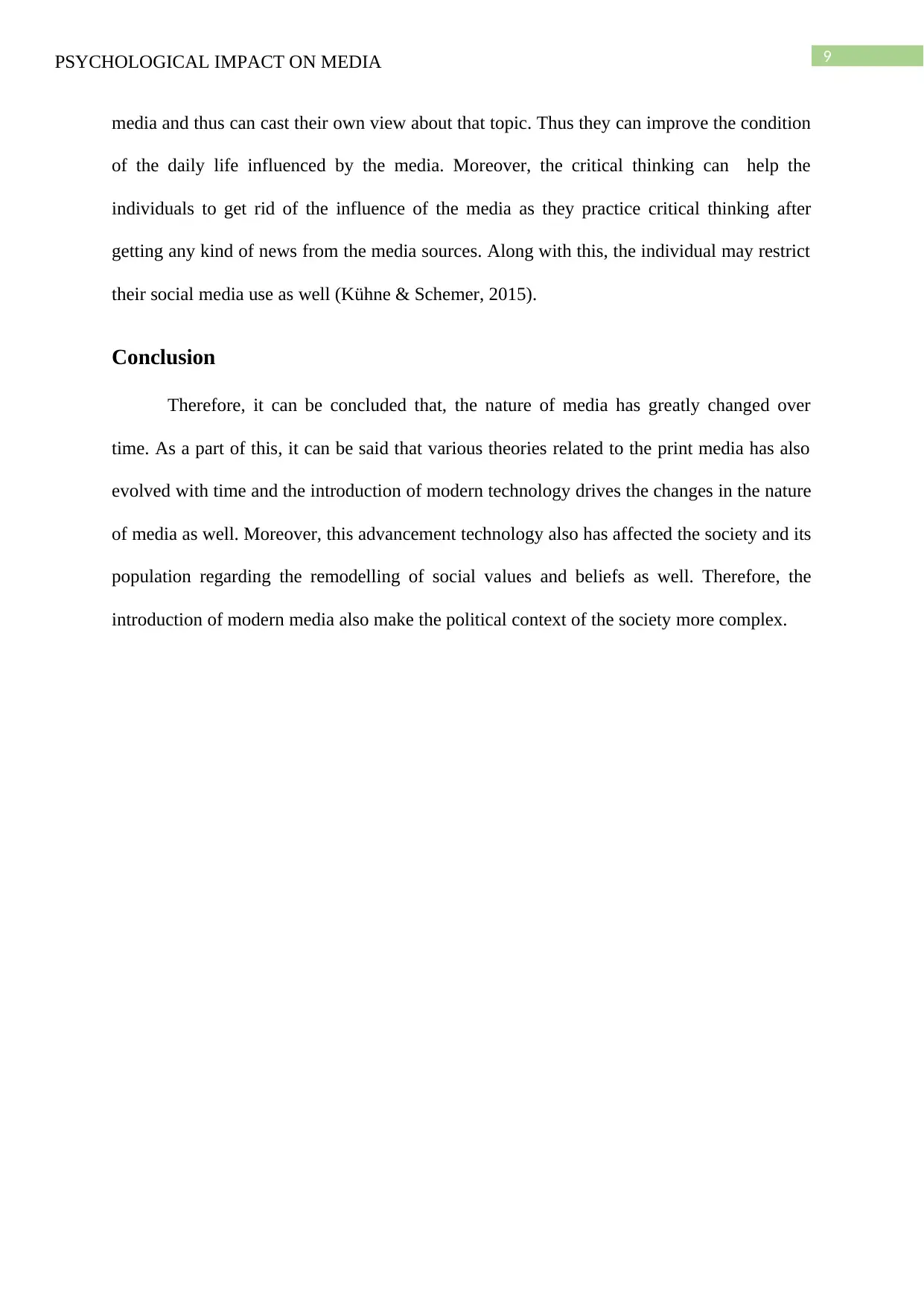
9PSYCHOLOGICAL IMPACT ON MEDIA
media and thus can cast their own view about that topic. Thus they can improve the condition
of the daily life influenced by the media. Moreover, the critical thinking can help the
individuals to get rid of the influence of the media as they practice critical thinking after
getting any kind of news from the media sources. Along with this, the individual may restrict
their social media use as well (Kühne & Schemer, 2015).
Conclusion
Therefore, it can be concluded that, the nature of media has greatly changed over
time. As a part of this, it can be said that various theories related to the print media has also
evolved with time and the introduction of modern technology drives the changes in the nature
of media as well. Moreover, this advancement technology also has affected the society and its
population regarding the remodelling of social values and beliefs as well. Therefore, the
introduction of modern media also make the political context of the society more complex.
media and thus can cast their own view about that topic. Thus they can improve the condition
of the daily life influenced by the media. Moreover, the critical thinking can help the
individuals to get rid of the influence of the media as they practice critical thinking after
getting any kind of news from the media sources. Along with this, the individual may restrict
their social media use as well (Kühne & Schemer, 2015).
Conclusion
Therefore, it can be concluded that, the nature of media has greatly changed over
time. As a part of this, it can be said that various theories related to the print media has also
evolved with time and the introduction of modern technology drives the changes in the nature
of media as well. Moreover, this advancement technology also has affected the society and its
population regarding the remodelling of social values and beliefs as well. Therefore, the
introduction of modern media also make the political context of the society more complex.
Paraphrase This Document
Need a fresh take? Get an instant paraphrase of this document with our AI Paraphraser
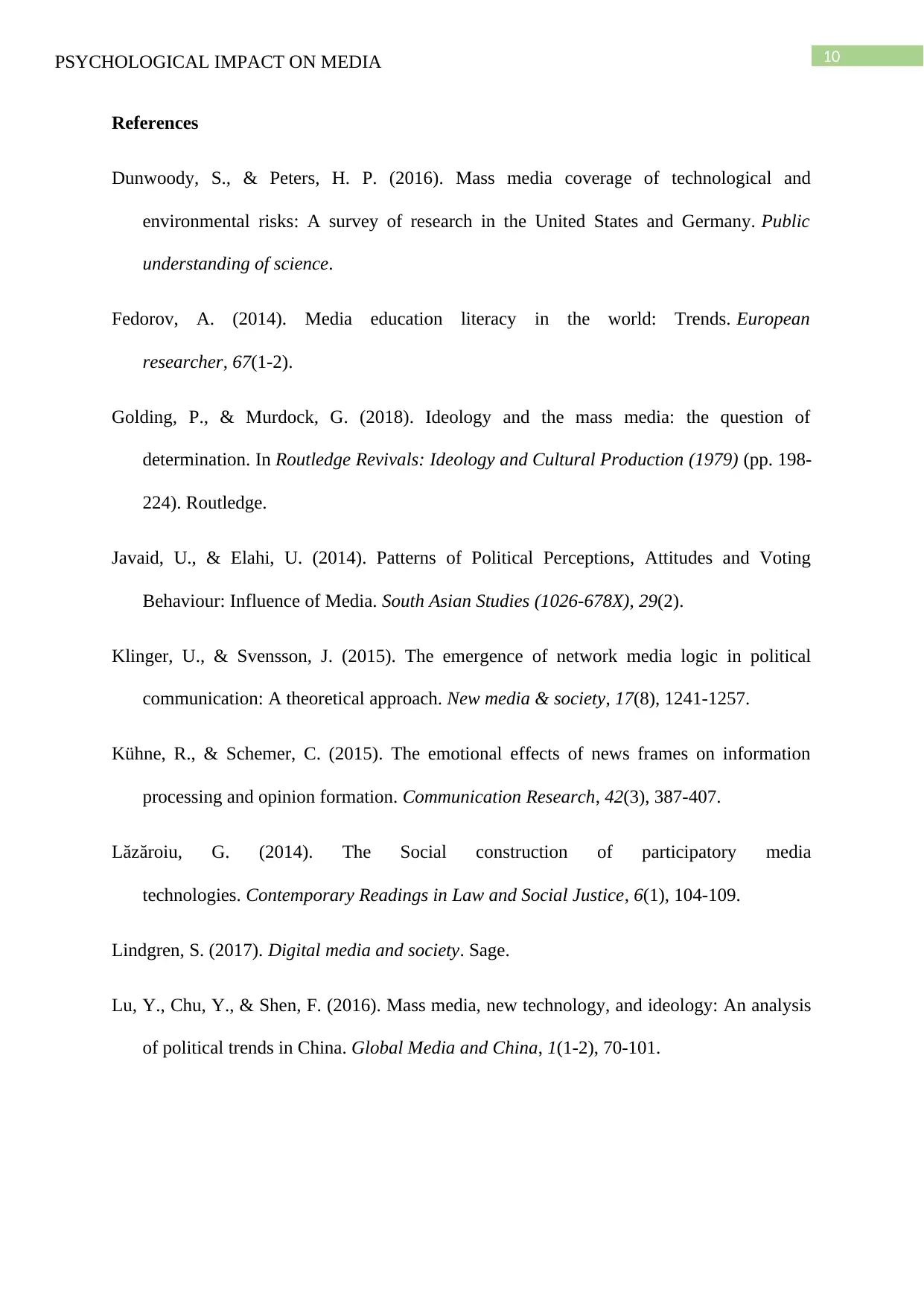
10PSYCHOLOGICAL IMPACT ON MEDIA
References
Dunwoody, S., & Peters, H. P. (2016). Mass media coverage of technological and
environmental risks: A survey of research in the United States and Germany. Public
understanding of science.
Fedorov, A. (2014). Media education literacy in the world: Trends. European
researcher, 67(1-2).
Golding, P., & Murdock, G. (2018). Ideology and the mass media: the question of
determination. In Routledge Revivals: Ideology and Cultural Production (1979) (pp. 198-
224). Routledge.
Javaid, U., & Elahi, U. (2014). Patterns of Political Perceptions, Attitudes and Voting
Behaviour: Influence of Media. South Asian Studies (1026-678X), 29(2).
Klinger, U., & Svensson, J. (2015). The emergence of network media logic in political
communication: A theoretical approach. New media & society, 17(8), 1241-1257.
Kühne, R., & Schemer, C. (2015). The emotional effects of news frames on information
processing and opinion formation. Communication Research, 42(3), 387-407.
Lăzăroiu, G. (2014). The Social construction of participatory media
technologies. Contemporary Readings in Law and Social Justice, 6(1), 104-109.
Lindgren, S. (2017). Digital media and society. Sage.
Lu, Y., Chu, Y., & Shen, F. (2016). Mass media, new technology, and ideology: An analysis
of political trends in China. Global Media and China, 1(1-2), 70-101.
References
Dunwoody, S., & Peters, H. P. (2016). Mass media coverage of technological and
environmental risks: A survey of research in the United States and Germany. Public
understanding of science.
Fedorov, A. (2014). Media education literacy in the world: Trends. European
researcher, 67(1-2).
Golding, P., & Murdock, G. (2018). Ideology and the mass media: the question of
determination. In Routledge Revivals: Ideology and Cultural Production (1979) (pp. 198-
224). Routledge.
Javaid, U., & Elahi, U. (2014). Patterns of Political Perceptions, Attitudes and Voting
Behaviour: Influence of Media. South Asian Studies (1026-678X), 29(2).
Klinger, U., & Svensson, J. (2015). The emergence of network media logic in political
communication: A theoretical approach. New media & society, 17(8), 1241-1257.
Kühne, R., & Schemer, C. (2015). The emotional effects of news frames on information
processing and opinion formation. Communication Research, 42(3), 387-407.
Lăzăroiu, G. (2014). The Social construction of participatory media
technologies. Contemporary Readings in Law and Social Justice, 6(1), 104-109.
Lindgren, S. (2017). Digital media and society. Sage.
Lu, Y., Chu, Y., & Shen, F. (2016). Mass media, new technology, and ideology: An analysis
of political trends in China. Global Media and China, 1(1-2), 70-101.
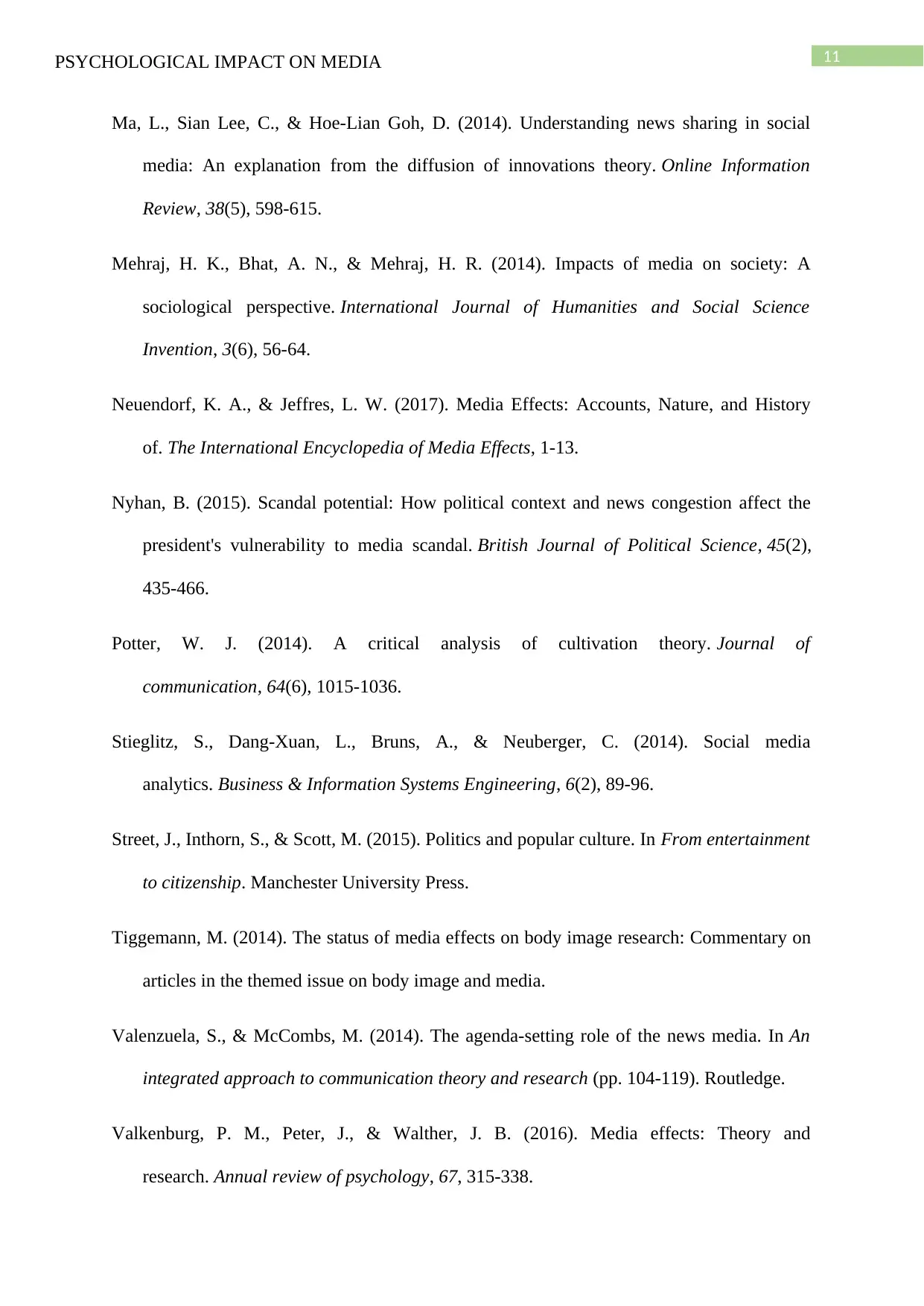
11PSYCHOLOGICAL IMPACT ON MEDIA
Ma, L., Sian Lee, C., & Hoe-Lian Goh, D. (2014). Understanding news sharing in social
media: An explanation from the diffusion of innovations theory. Online Information
Review, 38(5), 598-615.
Mehraj, H. K., Bhat, A. N., & Mehraj, H. R. (2014). Impacts of media on society: A
sociological perspective. International Journal of Humanities and Social Science
Invention, 3(6), 56-64.
Neuendorf, K. A., & Jeffres, L. W. (2017). Media Effects: Accounts, Nature, and History
of. The International Encyclopedia of Media Effects, 1-13.
Nyhan, B. (2015). Scandal potential: How political context and news congestion affect the
president's vulnerability to media scandal. British Journal of Political Science, 45(2),
435-466.
Potter, W. J. (2014). A critical analysis of cultivation theory. Journal of
communication, 64(6), 1015-1036.
Stieglitz, S., Dang-Xuan, L., Bruns, A., & Neuberger, C. (2014). Social media
analytics. Business & Information Systems Engineering, 6(2), 89-96.
Street, J., Inthorn, S., & Scott, M. (2015). Politics and popular culture. In From entertainment
to citizenship. Manchester University Press.
Tiggemann, M. (2014). The status of media effects on body image research: Commentary on
articles in the themed issue on body image and media.
Valenzuela, S., & McCombs, M. (2014). The agenda-setting role of the news media. In An
integrated approach to communication theory and research (pp. 104-119). Routledge.
Valkenburg, P. M., Peter, J., & Walther, J. B. (2016). Media effects: Theory and
research. Annual review of psychology, 67, 315-338.
Ma, L., Sian Lee, C., & Hoe-Lian Goh, D. (2014). Understanding news sharing in social
media: An explanation from the diffusion of innovations theory. Online Information
Review, 38(5), 598-615.
Mehraj, H. K., Bhat, A. N., & Mehraj, H. R. (2014). Impacts of media on society: A
sociological perspective. International Journal of Humanities and Social Science
Invention, 3(6), 56-64.
Neuendorf, K. A., & Jeffres, L. W. (2017). Media Effects: Accounts, Nature, and History
of. The International Encyclopedia of Media Effects, 1-13.
Nyhan, B. (2015). Scandal potential: How political context and news congestion affect the
president's vulnerability to media scandal. British Journal of Political Science, 45(2),
435-466.
Potter, W. J. (2014). A critical analysis of cultivation theory. Journal of
communication, 64(6), 1015-1036.
Stieglitz, S., Dang-Xuan, L., Bruns, A., & Neuberger, C. (2014). Social media
analytics. Business & Information Systems Engineering, 6(2), 89-96.
Street, J., Inthorn, S., & Scott, M. (2015). Politics and popular culture. In From entertainment
to citizenship. Manchester University Press.
Tiggemann, M. (2014). The status of media effects on body image research: Commentary on
articles in the themed issue on body image and media.
Valenzuela, S., & McCombs, M. (2014). The agenda-setting role of the news media. In An
integrated approach to communication theory and research (pp. 104-119). Routledge.
Valkenburg, P. M., Peter, J., & Walther, J. B. (2016). Media effects: Theory and
research. Annual review of psychology, 67, 315-338.
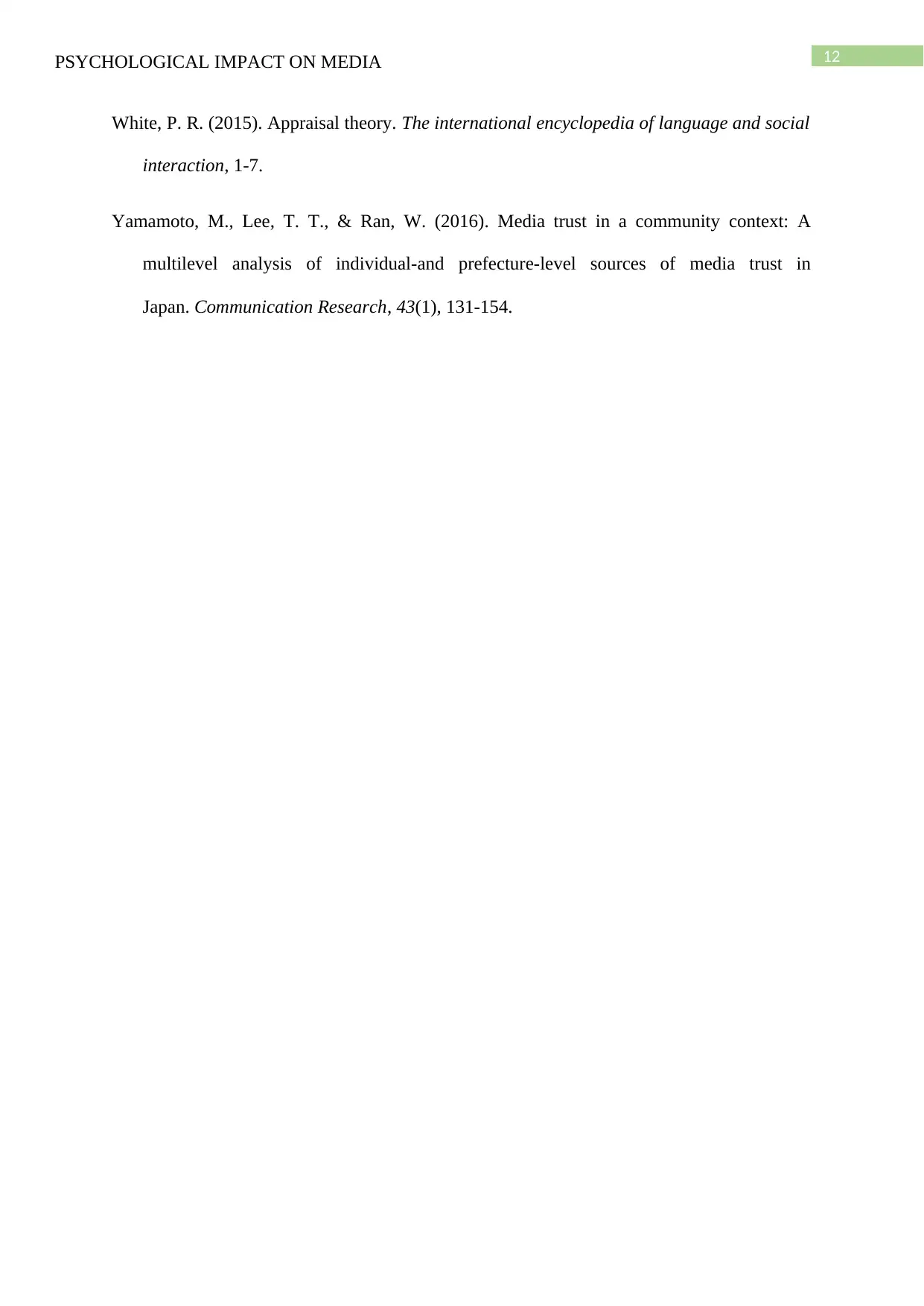
12PSYCHOLOGICAL IMPACT ON MEDIA
White, P. R. (2015). Appraisal theory. The international encyclopedia of language and social
interaction, 1-7.
Yamamoto, M., Lee, T. T., & Ran, W. (2016). Media trust in a community context: A
multilevel analysis of individual-and prefecture-level sources of media trust in
Japan. Communication Research, 43(1), 131-154.
White, P. R. (2015). Appraisal theory. The international encyclopedia of language and social
interaction, 1-7.
Yamamoto, M., Lee, T. T., & Ran, W. (2016). Media trust in a community context: A
multilevel analysis of individual-and prefecture-level sources of media trust in
Japan. Communication Research, 43(1), 131-154.
1 out of 13
![[object Object]](/_next/static/media/star-bottom.7253800d.svg)



